 |
Trials New and Noteworthy |
 |
The Alpha 6 release contains various improvements focused around card rulings.
The Card Rulings view appears at the bottom of the Wizard's Familiar window, next to the Card Library. As you select cards in the Card Library or the active deck the rulings view updates. This view shows you the rulings on a card from a variety of sources. You can create as many new Card Rulings views as you wish.
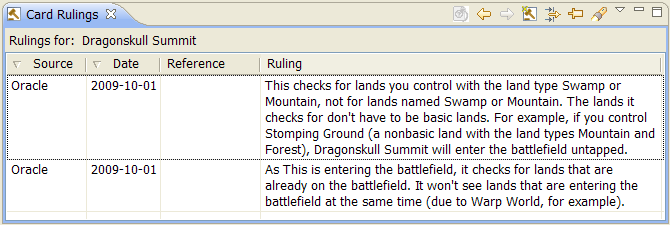
To create a new Card Rulings view press the new button ( )
on the view's tool bar or select the Create New Card Rulings View command from
the view menu (access by pressing the
)
on the view's tool bar or select the Create New Card Rulings View command from
the view menu (access by pressing the  menu button).
menu button).
You can also pin a Card Rulings view by toggling the pin button ( ) (also available on
the view's menu). Once a view is pinned it will not change the card it shows as the selected card in
Wizard's Familiar changes until you unpin it.
) (also available on
the view's menu). Once a view is pinned it will not change the card it shows as the selected card in
Wizard's Familiar changes until you unpin it.
Each Card Rulings view remembers its card history. You can navigate backwards ( ) and forwards (
) and forwards ( ) in the view's
history.
) in the view's
history.
The search bar button ( )
and the Search Bar command in the view menu toggle the search bar at the
top of the view. The search bar allows you to type a card name or part of a card name. Pressing
the search button (
)
and the Search Bar command in the view menu toggle the search bar at the
top of the view. The search bar allows you to type a card name or part of a card name. Pressing
the search button ( )
or pressing the Enter key will search for the the card name typed into the search
text box. If the typed name matches a card its rulings will be displayed:
)
or pressing the Enter key will search for the the card name typed into the search
text box. If the typed name matches a card its rulings will be displayed:
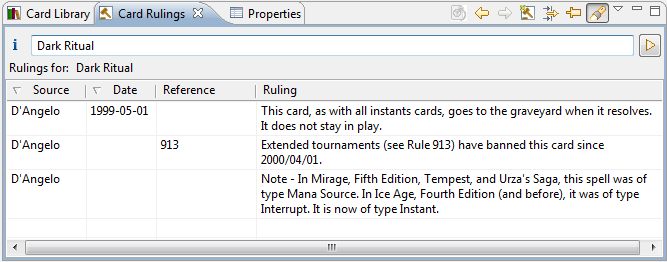
If the name does not match there will be no change to the displayed card. Hints for possible matches will appear when the error icon is clicked on:
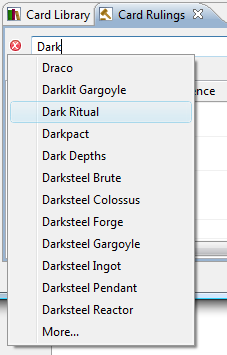
Even if the type typed name does match, hints to other similarly named cars are available when the info icon is clicked:
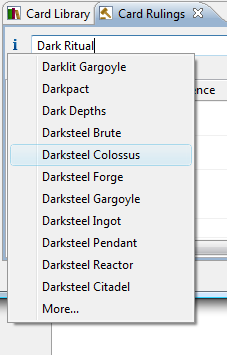
Selecting a card from the hint drop down will change the information view to show the selected card.
A copy of Stephen D'Angelo's Card Rulings and the Comprehensive Rules (see Crystal Keep's Magic Rules and Rulings) is included along side the product documentation. To display the Comprehensive Rules help use the Help | Help Contents menu command.
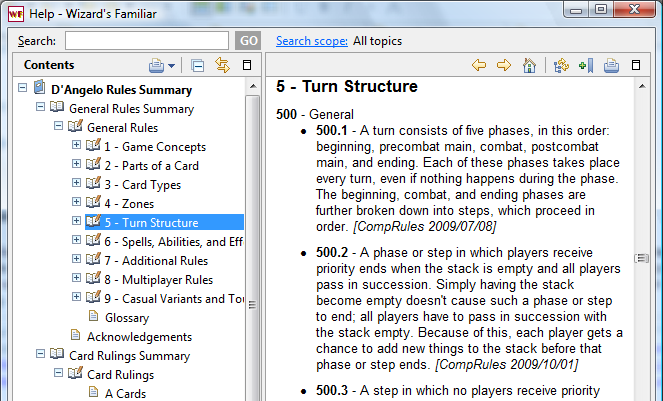
Some rulings have a reference in the Comprehensive Rules documentation. When a ruling has a rule
reference in the Reference column pressing the
Show Referenced Rule button (
 ),
with that rule selected, will open the help window displaying the rule. The card
Vampire Nighthawk has two rulings that have a reference in the
Comprehensive Rules documentation:
),
with that rule selected, will open the help window displaying the rule. The card
Vampire Nighthawk has two rulings that have a reference in the
Comprehensive Rules documentation:
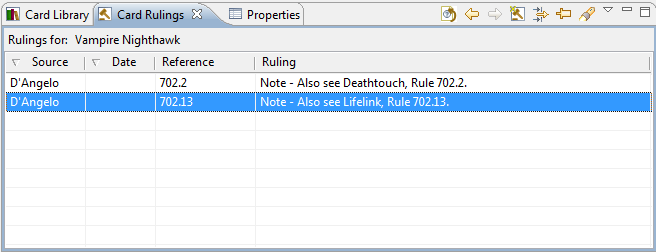
Pressing the Show Referenced Rule button displays the Comprehensive Rules documentation open to the referenced rule displayed:
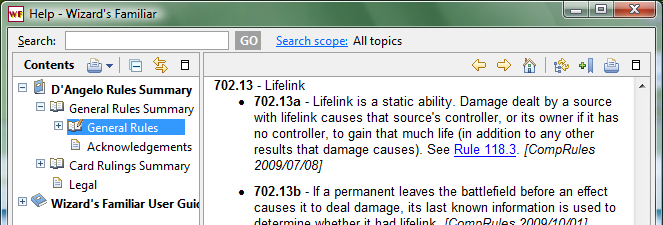
The Alpha 5 release contains various improvements to support first time users plus some general improvements such as saving card filters and allowing you to display scanned cards or custom artwork in the card information view.
The first two icons now let you get working right away. Clicking on the first icon takes you through a new interactive tutorial to create a deck with guidance. The second icon lets you get started right away to create a new deck on your own.
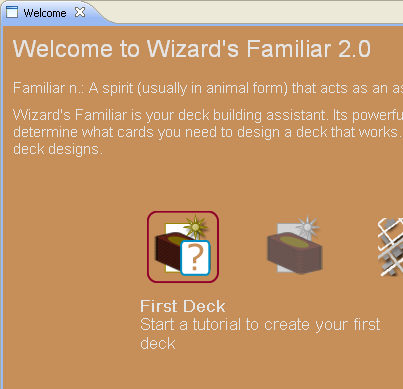
When ever you create a new deck a prompt appears to suggest what to do next. The prompt suggests that you drag and drop cards from the card library or items from the palette, both of which are labelled and visible by default.

The deck editor display has been cleaned up so that there is a clear separation between the number of cards and the name of the card.
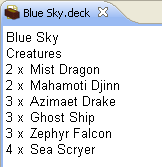
The context menu anywhere in the editor displays the Show Card Information sub-menu where additional information can be turned on for each card in the deck.
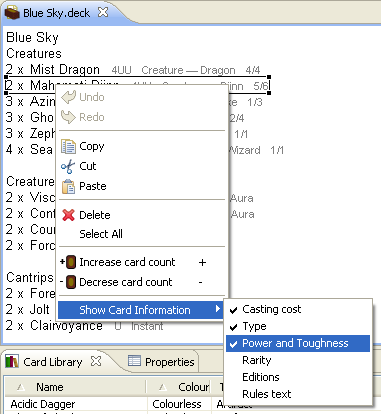
By default the card library shows all the cards available in a Standard tournament. You can also change which filter is displayed by default (by using the Set Default button in the preferences dialog box available from the main menu - Windows | Preferences | Card Library Filters). There is a set of filters provided that can be chosen from (currently Standard Cards and All Cards).
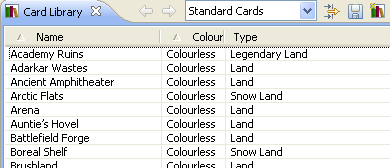
Card library filters can be saved for reference later. To save a filter press the save button
( ), a
dialog box will appear where a name can be specified:
), a
dialog box will appear where a name can be specified:
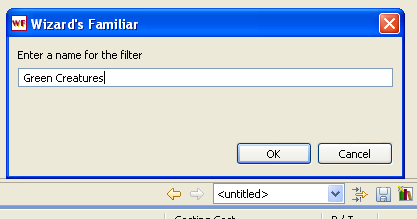
Once the filter has a name you can choose it from the filter drop down.

Whenever you change the filter for a Card Library the previous filter is recorded in a history list. You can move back and forward through the filters you have used previously.

After selecting a saved filter from the list you can press the back button ( ) to go back to your
previously filter.
) to go back to your
previously filter.

Press the forward button ( ) to return to your newest selected filter.
) to return to your newest selected filter.

The search bar at the top of the view allows you to type a card name or part of a card name. Pressing
the search button ( ) will search for the
the card name typed into the search text box. If the typed name matches a card it will be displayed
) will search for the
the card name typed into the search text box. If the typed name matches a card it will be displayed
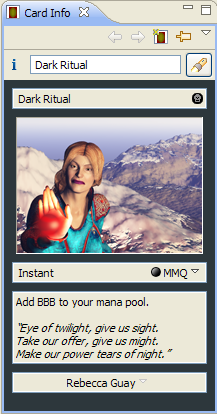
If the name does not match there will be no change to the displayed card. Hints for possible matches will appear when the error icon is clicked on:
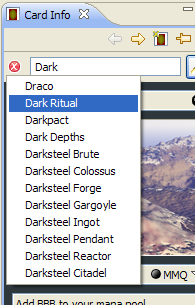
Even if the type typed name does match, hints to other similarly named cars are available when the info icon is clicked:
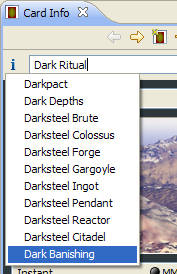
Selecting a card from the hint drop down will change the information view to show the selected card.
Each Card Information view remembers its card history. You can navigate backwards ( ) and forwards (
) and forwards ( ) in the view's
history.
) in the view's
history.
If you have a collection of Magic the Gathering cards and you want to see their images in the Card Information view you can scan them for Wizard's Familiar to display. Or you can create your own artwork for any Magic the Gathering card. To specify the directory where your scanned card images are located use the Card Images preference page (select the menu Windows | Preferences and choose the Card Images entry in the preference tree). In the Card image directory edit box specify the directory where your scanned images are located
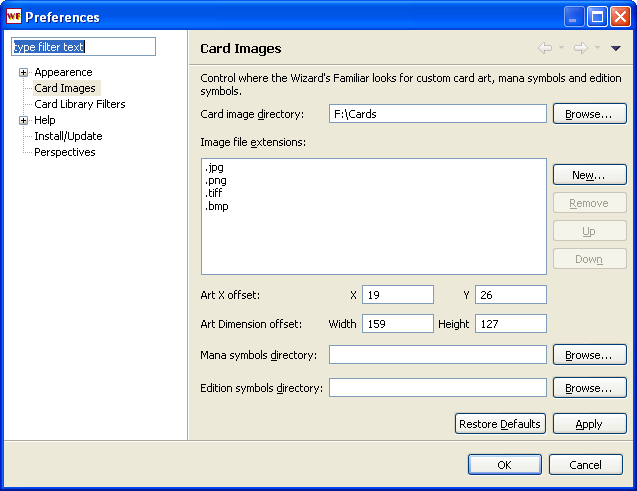
Wizard's Familiar searches for card images by looking under the directory specified in the Card image directory edit box. The first image file (with an extension found in the Image file extension list) will be used. The file name search rules are as follows:
in a directory named for the edition of the form "<card image dir>/<edition name>/<card name> (e.g. "<card image dir>/Seventh Edition/Howl from Beyond.png", "<card image dir>/Seventh_Edition/Howl_from_Beyond.png")
in the top level directory (e.g. "<card image dir>/Howl from Beyond.png" or "<card image dir>/Howl_from_Beyond.png")
Image files types are searched for in the order listed in the Image file extension list list. Any card or edition names can use spaces or under scores ('_') in their names (but do not use combinations in one name e.g. "Howl from_Beyond would not be found").
If you leave the Art offset and Art dimension boxes empty the full card image is shown in the Card Information view.
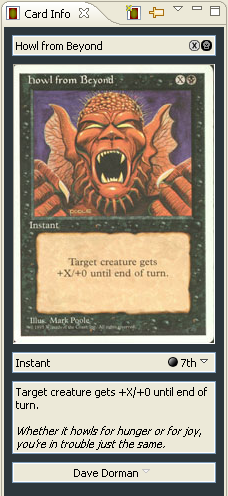
To display only the card's art from cards scanned in full use the Art offset and Art dimension boxes. Enter the x and y coordinates for the top left corner of the card art (relative to the top left corner of the image). Enter the width and height of the card art on the card. Now the Card Information view will show only a portion of the full scanned image.
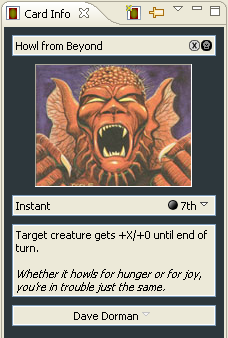
Different versions of a card's art can be selected using the choose edition drop down
( -
located next to the rarity symbol and edition abbreviation under the card art). For example while viewing
information about the card Island select the Tempest edition version from the
drop down and the Card Information view will look like:
-
located next to the rarity symbol and edition abbreviation under the card art). For example while viewing
information about the card Island select the Tempest edition version from the
drop down and the Card Information view will look like:
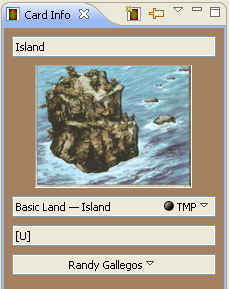
Some cards have additional versions of their card art. If this is the case, select the choose art
drop down button
( -
located next to the artist's name at the bottom of the Card Information view). Selecting a different
artist will show the new art work for the card.
-
located next to the artist's name at the bottom of the Card Information view). Selecting a different
artist will show the new art work for the card.
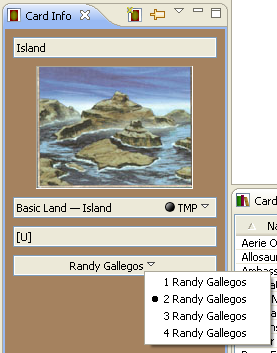
Cards can be inserted by name using the Card tool. Click on the tool in the pallette and then click in the deck to insert a card.

The new card is placed in name edit mode after being inserted. Type the name of the card to insert. Don't worry about typing in the exact name. Wizard's Familiar will offer suggestions if it cannnot recognize the typed in name.

If the typed in name does not match a known card Wizard's Familiar hightlights the card in red on grey. Pressing F2 or choosing Rename on the card's context menu allows retypeing the card name.

Alternativley the unknown card's context menu also offers suggestions for card names that do exist and are close to what was typed.
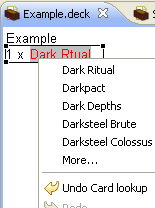
If the context menu suggestions do not contain the desired card name choose More... from the card's context menu. The Card Name Suggestion dialog box will be displayed . From this dialog box review the Suggestions list for other near matches. Use the Card name text box to try typing a different name; press the Suggest button to repopluate the Suggetions list based on the newly typed name. Pressing the Change button will change the selected card's name to either the selection in the Suggestions list or the contents of the Card name text box if there is no selection in the list.
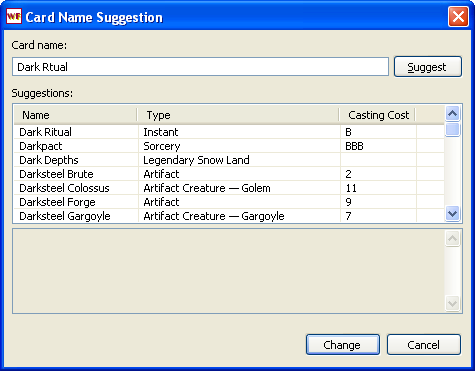
Once the typed in name is recognized or a card name is chosen from the context menu or the Card Name Suggestion dialog the chosen card is displayed a usual.

Basic lands can be inserted directly from the tool pallette instead of having to find them in the Card Library. Click a basic land tool from the tool pallette (for example the Forests tool).
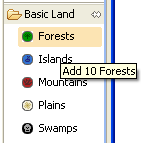
Then click on the deck to insert 10 of the choosen basic lands. Pressing the + or - keys will increase and decrease the count from 10. Inserting a second time using the same tool will increase the land count by 10.

The currently visible card in the Card Information view can be added to a deck by drag and drop. Clicking and dragging from the image or the frame will drag one copy of the viewed card into the deck.
The patch for Alpha 4 contains improvements to the Card Library to test the ability to deploy bug fixes to the field. After updating the product, the Card Library will support sorting and the status line will tell you how many cards are displayed in the library.
The card library supports sorting by one or more columns. Clicking on the column headers with the left mouse button changes the sort. Holding down the Ctrl or Shift keys while clicking on the header adds to the sort list or changes the direction a column is sorted in. The tool tip for any sorted column will tell you the sort order.
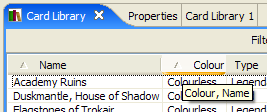
To sort the columns by colour and then by name (as shown in the example above) click on the Colour column header and then Ctrl click on the Name column header. To reverse the direction the colours are sorted Ctrl click again on the Colour column header.
When a card library has focus the status line contains the number of cards showing in the library.

The Alpha 4 release is designed to add full text searching to the card library search capabilities. The deck editor gets a minor improvement - status line displays the number of cards in your deck
To display the Card Library's Edit Filter dialog press the filter button ( ) on the
view's tool bar or select the Edit Card Filter menu command from the view
menu (access by pressing the
) on the
view's tool bar or select the Edit Card Filter menu command from the view
menu (access by pressing the  menu button).
menu button).
The new Edit Card Filter dialog has two modes; simple and advanced.
All of the controls for selecting Editions, Colours etc. are the same as described for Alpha 3 bellow accept that restricting to sub types is now an advanced activity.

The dialog has an Advanced button. Switching to advanced mode allows the following additional capabilies:
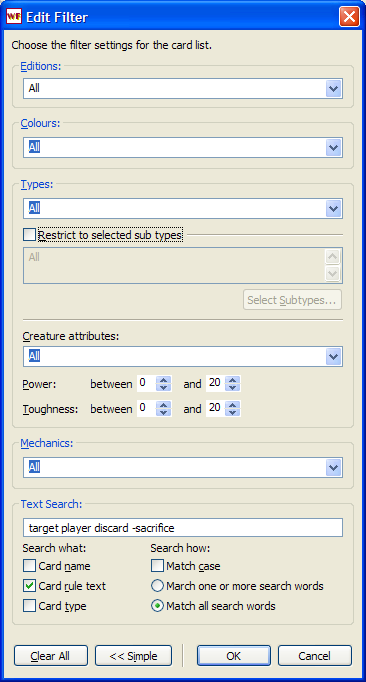
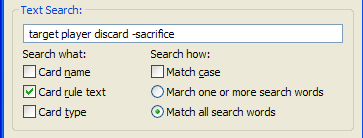
Enter the words you wish to serach for in the Text Search text box. The filter will look for cards with those words. You can preceed a word with a '-' character to eliminate cards with that word from the result set. You can choose to serach the card's name, rule text and type. You can choose if your search words should be found with the exact case you typed or not. You can also decide if you want only cards that contain all your words or cards that contain any of your words.
In the example depicted above the filter will retrieve all cards that can cause a target player to discard cards that do not require an additional sacrifice.
When a deck editor has focus the status line contains information about the number of cards in the deck. The status line shows the total number of cards in the deck as well as a break down of the number of each basic type; land, creature, enchangment, artifact, instant and sorcery.

The Alpha 3 release is designed to try out the card library search capabilities.
To display the Card Library's Edit Filter dialog press the filter button ( ) on the
view's tool bar or select the Edit Card Filter menu command from the view
menu (access by pressing the
) on the
view's tool bar or select the Edit Card Filter menu command from the view
menu (access by pressing the  menu button).
menu button).

Each of the sections of the dialog allow you to select your search criteria in a number of ways:
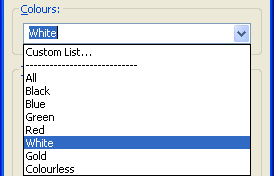
When typing into the drop down list your text is automaticly checked for correctness. If what you have typed does not match an entry in the drop down list an error icon is displayed. If you click on the error icon it will offer you a choice of close matches to select.
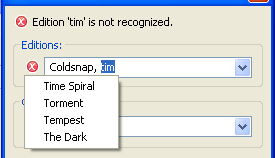
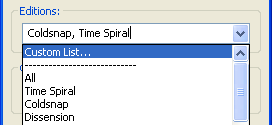
The Custom List dialog box lets you select any number of items from the drop down list. Selected items will appear as a comma separated list once you press OK.
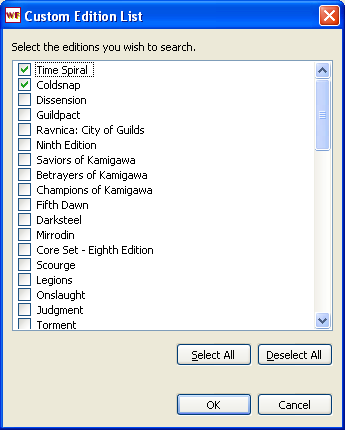
The type filtering combo box allows you to filter based on basic types. If you check the Restrict to selected sub-types check box you can filter additionally on sub-types as well.

The Sub-type list dialog box lets you select sub types for each of the various basic types from a tree.
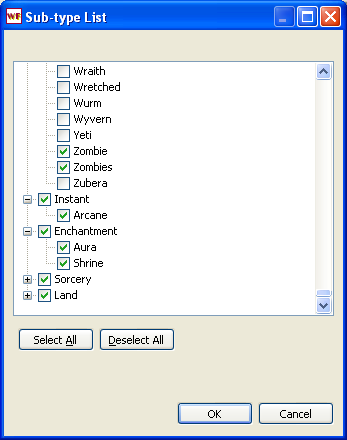

Creatures can be filtered by thie unique attributes; power, toughness and creature abilities. The simple version allows you to select from a drop down list of named sets of attributes. For example the name Weenies will filter creatures so that only those with a power and toughness of 2 or less are shown.

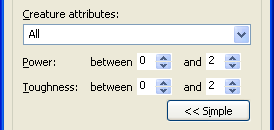
The Alpha 2 release is designed to try out the deck editor. It supports creating, editing and saving decks.
Wizard's Familiar supports creating and editing decks. The deck editor lists all the cards in an ordered list. You can drag and drop cards from the Card Library into the deck or you can copy and paste cards into the deck (if the text is in the format number space card name). You can also add text to your deck by using the Text Creation tool from the tool palette.
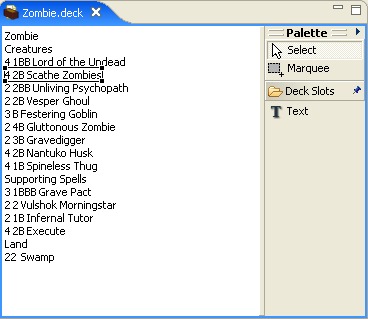
The Card Information view now allows you to choose which version of a card to show the
information for. If the displayed card was printed in more than one edition then the edition choice
button ( ),
next to the current edition name, will be enabled. Clicking the edition choice button will display a
drop down menu listing the editions the card was printed in.
),
next to the current edition name, will be enabled. Clicking the edition choice button will display a
drop down menu listing the editions the card was printed in.
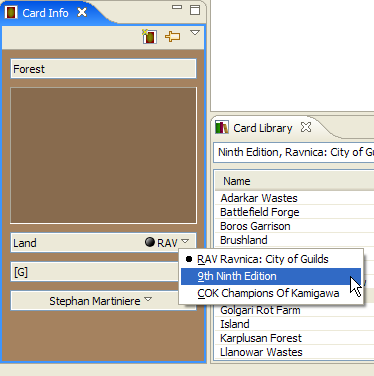
If that card appears with more then one picture / flavour text combination in the chosen
edition then the version choice button ( ), next to the artist name, will be enabled. Clicking on
the version choice button will display a drop down menu listing the artist's names for each version
of the card that appeared in that edition.
), next to the artist name, will be enabled. Clicking on
the version choice button will display a drop down menu listing the artist's names for each version
of the card that appeared in that edition.
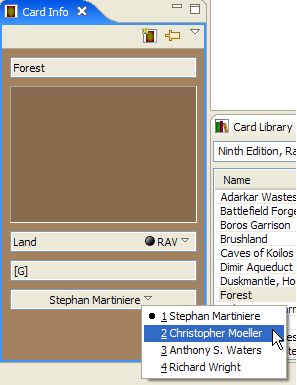
The Alpha 2 release provides help documentation for all the functionality available in Alpha 2. Introductory documentation is available from the Welcome Page. Full help is available from the regular help system. Use the Help | Help Contents menu item to see the help. Also context sensitive help is available from the UI press the F1 key to get context sensitive help.
The Alpha 1 release was designed to offer an early look at the over all look and feel of the product and to test the Card Library and Card Information views along with the basic database update mechanism.
The Card Library appears at the bottom of the Wizard's Familiar window. Here you can pick the Edition you are interested in from the edition list combo box. To see the cards in that edition press the Retrieve button. You can create as many new Card Library views as you wish.
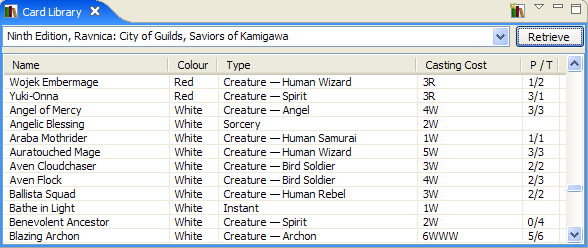
To create a new Card Library view press the new button ( )
on the view's tool bar or select the Create New Card Library menu command
from the view menu (access by pressing the
)
on the view's tool bar or select the Create New Card Library menu command
from the view menu (access by pressing the  menu button).
menu button).
The Card Information view appears at the left of the Wizard's Familiar window. As you select cards in the Card Library the information view updates. This view shows you the detailed information about a card. You can create as many new Card Library views as you wish.
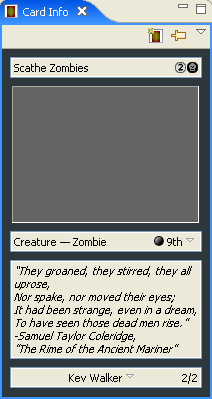
To create a new Card Information view press the new button ( )
on the view's tool bar or select the Create New Card Info View command from
the view menu (access by pressing the
)
on the view's tool bar or select the Create New Card Info View command from
the view menu (access by pressing the  menu button).
menu button).
You can also pin a Card Information view by toggling the pin button ( ) (also available on
the view's menu). Once a view is pinned it will show the information about the last selected card
until you unpin it.
) (also available on
the view's menu). Once a view is pinned it will show the information about the last selected card
until you unpin it.
Alpha 1 ships with a small database of cards. It contains only the editions legal in a Standard tournament. A database is available that contains all editions. To update your copy use the Update menu command Help | Search for Update.... Follow the instructions and let the program restart. Once restarted you should have more editions to choose from in the Card Library view.